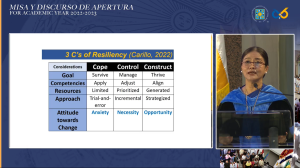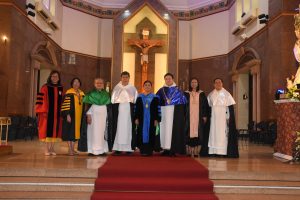Cope, control, and construct – the University of Santo Tomas Assistant to the Rector for Planning and Quality Management Prof. Clarita DL. Carillo, Ph.D., offered a descriptive continuum of the category of responses demonstrated by higher education institutions to face the challenges, changes, and chances brought about by a VUCA environment, which may not be limited to the current pandemic, during the Discurso de Apertura (inaugural lecture) on August 4, 2022, at the UST Chapel (Santísimo Rosario Parish Church).


Titled “Quality Assurance and the 3Cs of Resiliency as Philippine Academic Institutions Move Forward,” Dr. Carillo anchored her discussions on the direct and vicarious experiences of Philippine higher education institutions, highlighting the University’s own experience, in transitioning from in-person classes to the Enriched Virtual Mode of instruction. As Dr. Carillo explained, “[UST] served as a model for many Philippine higher education institutions [HEIs], silently observed and trailed, for both its coping and innovative practices, as these were trialed and tested vis-à-vis its considerably large population and the consequent complexity factors.”
As news of the pandemic began developing in January of 2020, the Office of the Vice Rector for Academic Affairs, led by Prof. Cheryl R. Peralta, DrPH, came up with the Continuity Plan for Teaching and Learning in consultation with the administrative and academic unit heads, with the approval of then-Acting Rector Very Rev. Fr. Richard G. Ang, O.P., Ph.D. and deployed it on March 9, 2020. Later that afternoon, the Manila City Mayor suspended classes and UST paused in-person instruction delivery for its more than 40,000 students.
By April 14, 2020, at the end of the government’s initially announced period of community quarantine, the University resumed classes online through the UST Cloud Campus (BlackBoard learning management system), which the University has been using for its eLearning activities for almost 20 years. Various support offices such as the Miguel de Benavides Library and the EdTech Center provided services to ensure that learning resources and access to subscription tools like the Microsoft 365 software line, GSuite for Education, Adobe Creative Cloud, Canva, Zoom, and the like remained virtually available for the Thomasian community.
To review, coordinate, and harmonize the initiatives to be taken by all the University administrative and academic units, Fr. Ang created the Task Force Veritas which worked based on a framework adapted from McKinsey & Company’s COVID-19 response model, suitably adjusted to the University’s own context and realities.
“The resiliency and adaptability that the University displayed during the last five pandemic-stricken Academic Terms can only proceed from an organization with an already established quality management system and operational quality assurance (QA) processes, which may not be perfect but have proven to function amid crises and challenges,” said Dr. Carillo.
Enumerating the 3Cs, Dr. Carillo elaborated that, initially, an organization may Cope with the current challenge. Given time, mere coping to survive can grow to having Control, or managing the uncertainty. By seeking and maximizing opportunities, an organization advances to Construct, or to aim to thrive despite crises. These 3Cs are “not one time, unilinear, or mutually exclusive, and may simultaneously occur while referring to different aspects of management and administration“ as the institution navigates volatile, uncertain, complex, and ambiguous (VUCA) situations.
“As universities attempt to deliver services to their stakeholders – primarily, our students – the underlying responsibility is not just to ‘manage’ to deliver, but to continue to deliver with quality.”
To create value for the stakeholders, implementing quality assurance (QA), or systematic processes for ensuring that services meet expected standards, is vital, explained Dr. Carillo, who also cautioned that QA is not as simple or linear in the educational context, for the ‘products’ of the system are human beings.
QA in education is based on achieving the ‘total formation’ of learners, delineated by expected learning outcomes and desired graduate attributes. It also delves into the administrative and academic support services, such as the library and various resources, counseling and career placement, well-being, enrollment and records management, among others, which aid teachers, students, and staff alike in the joint mission of formation.
Regular practice and enforcement of standards and processes, which may have initially started as preparations for quality validation during accreditation, are expected to lead to “an organizational maturity as regards quality management that progresses from compliance, to commitment, and finally to the cultivation of a quality culture,” Carillo said.
QA practices become systemic and systematic, and become reinforced through cultivated habits for continuous quality improvement, which UST implements by using the Plan-Do-Check-Act quality management framework.
“It might be a source of encouragement to remember these words from [the poet, novelist, and civil rights activist] Maya Angelou – and I paraphrase – ‘We can be changed by what happens to us, but we can refuse to be reduced by it,” Dr. Carillo concluded.
Dr. Carillo’s inaugural lecture joins the University’s longest serial publication, a collection of public addresses that contains lectures delivered at the beginning of every academic year from 1866 until now.
The traditional Discurso de Apertura is as old as the secondary education system in the Philippines, explained UST Secretary-General Rev. Fr. Louie R. Coronel, O.P., EHL, who served as the Master of Ceremonies.
Fr. Coronel further added that an inaugural academic lecture has been an essential part in the opening exercises of universities across Europe, and that the tradition was likely adapted by UST since its foundation to conform with the tradition of the Dominican houses of studies of starting every school year with a conference called Lectio Prima, or first lecture. This practice emerged from the statutes drafted by Fr. Juan Amador, O.P., in 1785.
Prior to leading the Office for Planning and Quality Management, Dr. Carillo served as Vice Rector for Academic Affairs from 2006 to 2017. Other posts that she has held include being the Assistant Dean of the College of Education in 1994, Director of the Center for Educational Research and Development in 2000, a member of the CHED Technical Working Group on Autonomous and Deregulated Universities in 2007, Commissioner of the Philippine Association of Colleges and Universities Commission on Accreditation (PACUCOA) in 2010. She is currently a lead assessor under the ASEAN University Network Quality Assurance (AUN-QA) and an assessor for the Commission on Higher Education Institutional Sustainability Assessment (CHED-ISA). She continues to be affiliated with the College of Education and the UST Graduate School.
On August 4, 2022, CBCP Vice President His Excellency Most Rev. Mylo Hubert Vergara, D.D., officially declared open the Academic Year 2022-2023 at the in-person Misa de Apertura, which was held prior to Dr. Carillo’s lecture. While most classes will still use the Enriched Virtual Mode, certain programs with the CHED Safety Seal proceed to have hybrid classes on campus, with cohorts attending classes from home or within classrooms depending on their schedule.



